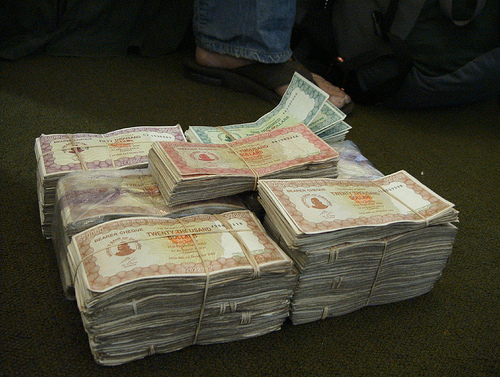 In Israel, more than in most countries, foreign currency is an integral part of every facet of the country’s daily economic enterprises – private, business, and public sectors, alike.
In Israel, more than in most countries, foreign currency is an integral part of every facet of the country’s daily economic enterprises – private, business, and public sectors, alike.
A recent released study showed that 53% of financial support to Israeli charities came from abroad. Thus, making foreign exchange exchange fees, rates, and processing times of the utmost importance to Israeli charities.
(N.B. While this post is most relevant for charities operating in Israel, its underlying principles are true regardless of location.)
WHY USE A MONEY CHANGER?
Cost
When using traditional financial institutions to process foreign currency, fees tend to be higher. This impression holds both for foreign currency transfers (wires) and checks — this is of course, assuming that many individuals and charities aren’t using banks that specialize in foreign currency (i.e. bankers unlike me).
The belief — and not necessarily correct — is that money changers offer better exchange rates, as well. Again, this is not always the case (see previous parentheses).
Speed
Turnaround is always an important factor when receiving money from abroad. One, because of exposure to currency fluctuation. Two, because of cash flow.
While money changers may have a shorter turnaround than banks vis-a-vis transfers, they definitely have a shorter turnaround than banks vis-a-vis foreign currency checks. (Though, everything comes at a price.)
Wow, seems pretty good. Why in the world shouldn’t a nonprofit organization use a money changer!?
After all, doesn’t the charity have an obligation to its constituents to make sure that the money it raises arrives at its destination as quickly and as cheaply as possible?
NO.
The mission of the charity is to show its donors and relevant governmental agencies transparency, control, and accountability for ever cent, agurah, peso, and shilling raised.
With respect to this charge, money changers are a danger to proper book keeping and the transparency everyone is demanding:
1. Lack of Control and Transparency
Whenever an organization uses a money changer it is voluntarily relinquishing control and permitting a third party to handle its money. While receipts can be issued and paper-trails followed, a small but unavoidable black hole is created.
Instead of having a bank statement that clearly shows where the donation originated from, the bank page will simply show an generic “incoming wire” (from the money changer) or even worse, an ambiguous “cash deposit.”
True Story: I have seen nonprofits arrive at a bank to deposit tens of thousands of shekel IN CASH. Now is this really the kind of impression an organization wants to make to its bank, donor or oversight body? Somehow, a wad of bills in a paper bag just doesn’t scream “trust me.”
2. Blurred Beneficiaries
When money is given to a money changer, the intended recipient is not the one either directly receiving the money nor cashing the check.
This is especially problematic with foreign currency checks, where the intended beneficiary never even deposits the check into the bank — an issue that effects the donor perhaps even more than the charity.
True story: Charities have no way of knowing where its money changer might redeem its check. Some money changers use Arab Banks to clear their checks. Putting politics aside, donors (and sometimes even the IRS) get mighty curious when a check earmarked for an Israeli cause has either “Bank of Cairo” or “Bank of Jordan” stamped on the back.
3. Cost is Now a Secondary Concern
In a previous post I quoted documentation that specifically mentions that cost is an irrelevant factor when the IRS examines a charity for effectiveness:
The Treasury Department is standing by its suggestions, thus, signaling to all that “life is simply more expensive and inconvenient as a result of global terrorism, and everyone is expected to bear a share of the new costs of doing business.”
And the IRS isn’t the only one using similar logic.
AND SPEAKING OF COST…
Did I mention that money changers might not even be cheaper than banks? If you’re looking for proof, contact me. I’ll make you a believer.
Tizku Lemitzvot,
Shuey
Disclaimer: This blog houses my personal opinions and is for informational purposes only — not advice. As charity laws can be quite complex, please refer all questions to qualified and licensed professional. Read the full disclaimer.
